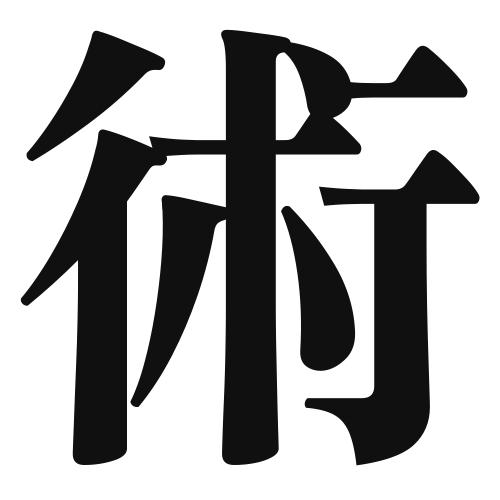1. Overview of Meaning
The kanji “術” (pronounced “jutsu” or “shutsu”) generally means “art,” “skill,” or “technique.” It refers to a method or practice in various fields, such as martial arts, medicine, or crafts.
2. Formation and Radical
Formation of the Kanji: The kanji “術” is a combination of two components. The left part, “行” (meaning “to go” or “to conduct”), suggests action, while the right part, “者” (meaning “person”), indicates a practitioner or someone who performs a skill. This kanji can be classified as a compound character (会意文字), as it combines meanings to convey the idea of a skilled person performing an action.
Radical: The radical of “術” is “行” (to go), which is often associated with movement or action.
3. Examples of Usage
Common Words and Phrases: Some frequently used words that include “術” are:
- 武術 (ぶじゅつ, bujutsu) – martial arts
- 技術 (ぎじゅつ, gijutsu) – technology or skill
- 医術 (いじゅつ, ijutsu) – medical technique
Example Sentences in Daily Conversation:
- 彼は武術の達人です。 (かれはぶじゅつのたつじんです。) – He is a master of martial arts.
- この技術はとても役に立ちます。 (このぎじゅつはとてもやくにたちます。) – This technique is very useful.
4. Synonyms and Antonyms
Similar Kanji: A similar kanji is “技” (ぎ, gi), which also means “skill” or “technique,” but it often emphasizes the craft or artistry aspect rather than the methodical practice.
Opposite Kanji: An antonym could be “無” (む, mu), meaning “nothing” or “without,” as it represents the absence of skill or technique.
5. Cultural and Historical Background
Relation to Japanese Culture: The concept of “術” is deeply embedded in Japanese culture, especially in traditional practices like martial arts, tea ceremonies, and various crafts. Mastery of a particular “術” is often seen as a lifelong pursuit.
Proverbs and Idioms: One common saying is “百聞は一見にしかず” (ひゃくぶんはいっけんにしかず), which translates to “Seeing is believing.” This emphasizes the importance of practical experience and skill over mere theoretical knowledge, aligning with the essence of “術.”
